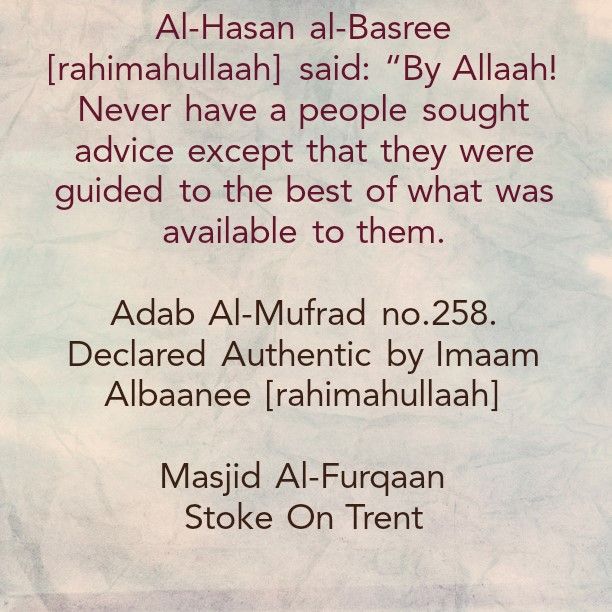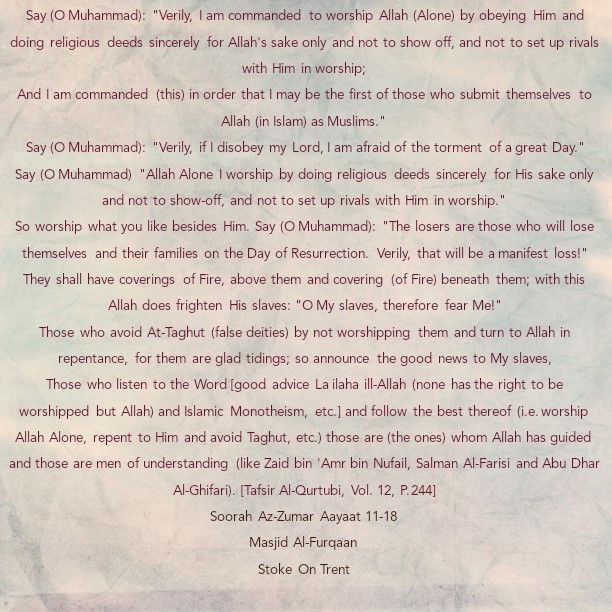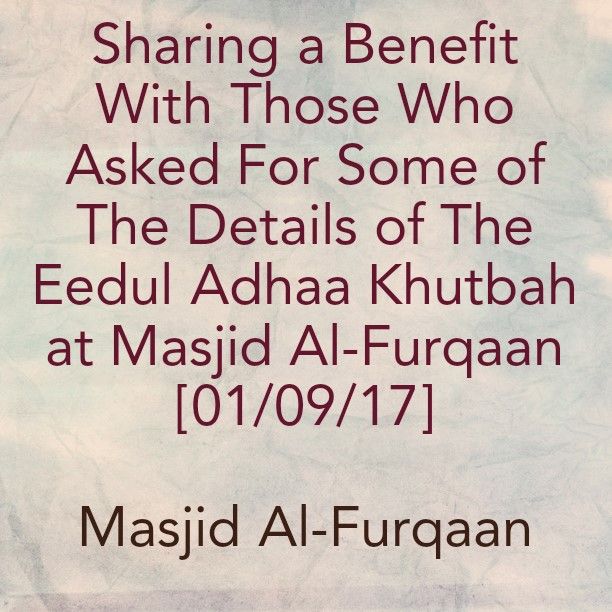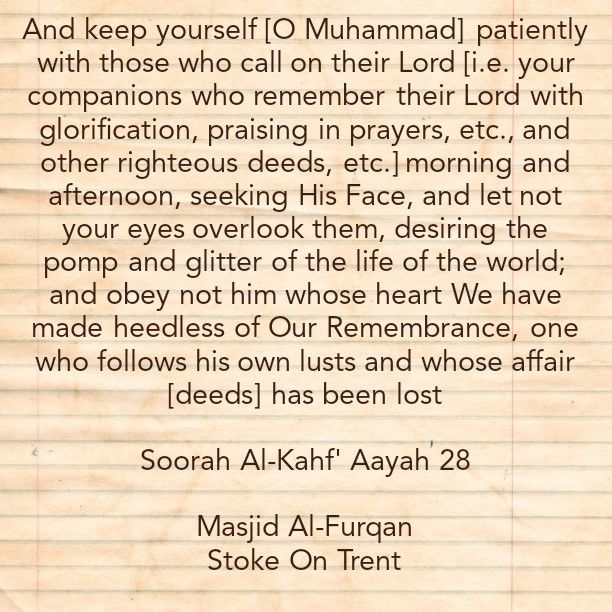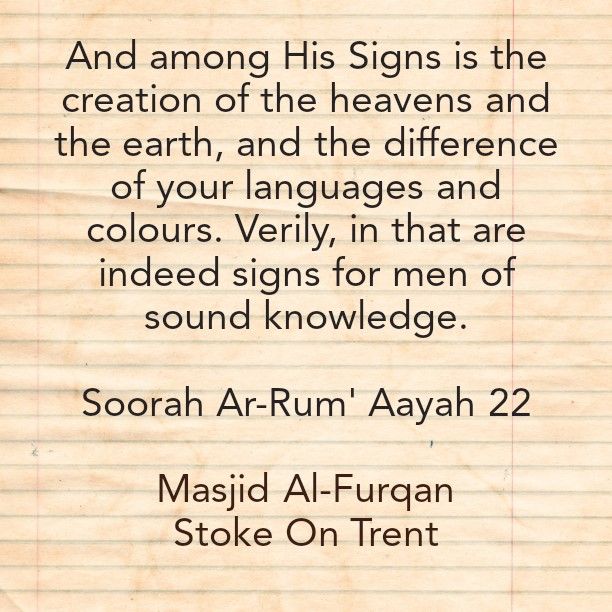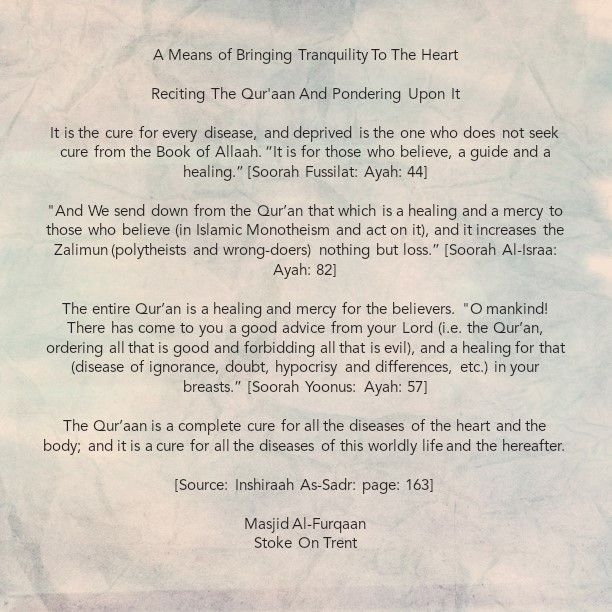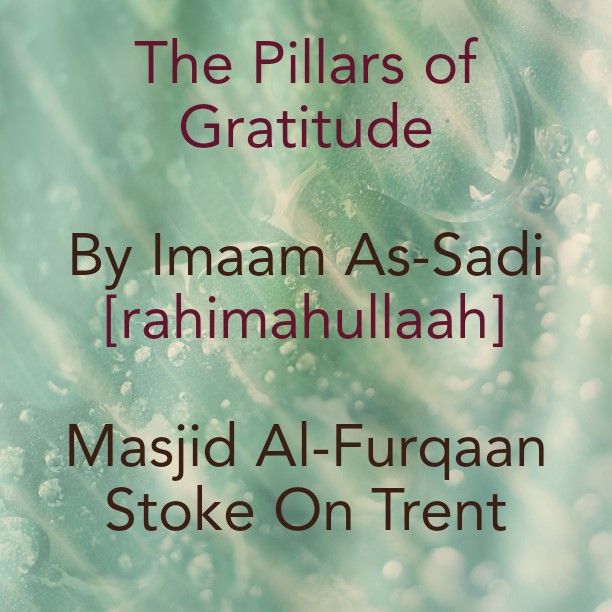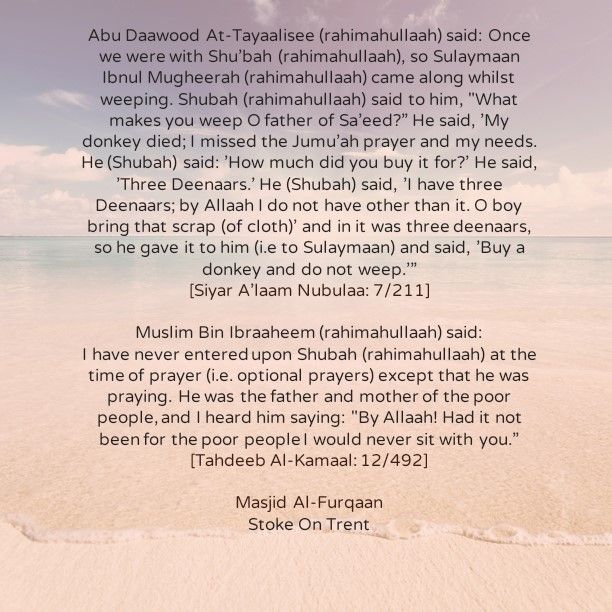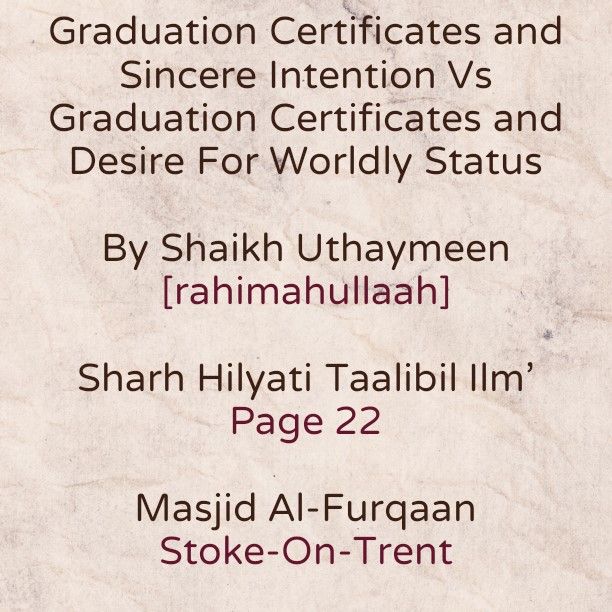In The Name of Allaah, The Most Merciful, The Bestower of Mercy
Some of The Means to Safety For The Ummah
Imaam Maalik [rahimahullaah] said:
لنْ َيصْلُحَ آخِرُ هَذِهِ الْأمة الَّا مَا أَصْلَحَ أَوَّلَهَا
The latter part of this Ummah [i.e. those who will come after the Salaf] will not be rectified except by way of that which rectified its earlier part [i.e. the Salaf].’’
Therefore, there can be no return to safety, security and strength unless we return to that which rectified the early generations of Islaam. Shaikh Saaleh Al-Fawzaan said, ‘’And from those first and foremost means to safety and security in this life and the next is means to safety in this life and the next, is that the Ummah has to be upon a sound Aqeedah – singling out Allaah in worship and abandoning everything that is worshipped besides Allaah – not invoking tombs, graves, shrines and other false objects of worship, rather worshipping Allaah alone without any partner is the greatest and first and foremost means to safety in this life and next. Allaah [The Most High] said:
[ٱلَّذِينَ ءَامَنُواْ وَلَمۡ يَلۡبِسُوٓاْ إِيمَـٰنَهُم بِظُلۡمٍ أُوْلَـٰٓٮِٕكَ لَهُمُ ٱلۡأَمۡنُ وَهُم مُّهۡتَدُونَ – It is those who believe and confuse not their belief with Zulm (wrong), for them (only) there is security and they are the guided. [‘6:82]
The meaning of [ٱلَّذِينَ ءَامَنُواْ -Those who believe]: Belief is Tawheed [pure Islamic Monotheism] – to worship Allaah [Alone] and keep away from worshipping others besides Him.
And regarding the statement of Allaah [ وَلَمۡ يَلۡبِسُوٓاْ إِيمَـٰنَهُم بِظُلۡمٍ- And confuse not their belief with zulm]- Meaning: They do not mix their belief in Tawheed with Zulm [i.e. Shirk], because Tawheed is corrupted when mixed with shirk. Hence, Tawheed can never be actualised with the presence of shirk, because two opposites cannot come together. [Ref 1]
Therefore, Zulm is Shirk, just as the Messenger [sallal-laahu-alayhi-wasallam] explained when this ayah caused some unease for the sahaabah. They [i.e. the sahaabah] said: ”O Messenger of Allaah! Which of us has not committed Zulm [i.e. wrong] against himself?” He [sallal-laahu-alayhi-wasallam] said: It is not as you think, for indeed Zulm means shirk. Haven’t you heard the saying of the righteous slave [i.e. Luqmaan]?
[ يَـٰبُنَىَّ لَا تُشۡرِكۡ بِٱللَّهِۖ إِنَّ ٱلشِّرۡكَ لَظُلۡمٌ عَظِيمٌ۬ – O my son! Join not in worship others with Allaah. Verily! Joining others in worship with Allaah is a great Zulm (wrong) indeed. [31:13]
Therefore, the intent behind Zulm in this ayah is Shirk. The one safe from shirk will have safety in this life and the next. He will receive guidance for being upon the truth.
And Allaah [Glorified be He and free is He from all imperfections] said:
وَعَدَ ٱللَّهُ ٱلَّذِينَ ءَامَنُواْ مِنكُمۡ وَعَمِلُواْ ٱلصَّـٰلِحَـٰتِ لَيَسۡتَخۡلِفَنَّهُمۡ فِى ٱلۡأَرۡضِ ڪَمَا ٱسۡتَخۡلَفَ ٱلَّذِينَ مِن قَبۡلِهِمۡ وَلَيُمَكِّنَنَّ لَهُمۡ دِينَہُمُ ٱلَّذِى ٱرۡتَضَىٰ لَهُمۡ وَلَيُبَدِّلَنَّہُم مِّنۢ بَعۡدِ خَوۡفِهِمۡ أَمۡنً۬اۚ يَعۡبُدُونَنِى لَا يُشۡرِكُونَ بِى شَيۡـًٔ۬اۚ
Allaah has promised those among you who believe and do righteous good deeds, that He will certainly grant them succession to (the present rulers) in the land, as He granted it to those before them, and that He will grant them the authority to practice their religion which He has chosen for them (i.e. Islaam). And He will surely give them in exchange a safe security after their fear (provided) that they (believers) worship Me and do not associate anything (in worship) with Me. [24:55]
These great promises [mentioned in the above ayah] cannot be accomplished except by way of this condition that is [يَعۡبُدُونَنِى لَا يُشۡرِكُونَ بِى شَيۡـًٔ۬ا (provided) they (i.e. the believers) worship Me (Allaah) and do not associate anything (in worship) with Me.
If this condition is fulfilled, then these noble promises of Allaah will be attained. Certainly, the believers will be granted succession to [the present rulers] in the land. Allaah will grant them authority to practice their religion, which He has chosen for them (i.e. Islaam) and will surely give them in exchange a safe security after their fear. These great aims [or goals] cannot be achieved except by way of Tawheed, and that is to worship Allaah (alone), and abandon worship of other than Him.
[Ref 1] Major Shirk and Minor Shirk: The Shaikh, Saaleh Al-Fawzaan [may Allaah preserve him] stated in his book titled ‘Duroos Minal Qur’aan’ that minor shirk does not expel a person from the Milla (i.e. the religion). Minor shirk is related words uttered by a person, such as one who says, ‘‘Had it not been for Allaah and you’’ or ‘’what Allaah and you will’’. This is minor shirk on condition that the person does not hold it as belief in his heart. The Shaikh also spoke of other types of apparent minor Shirk, such as swearing by other than Allaah, and Hidden Minor Shirk such as Riyaa [showing off in worship]. [See Duroos Minal Qur’aan for further details. Page: 172]. The reader must read the article in this link [http://www.abukhadeejah.com/ahmad-an-najmees-kitaab-at-tawheed-chapter-3-fear-of-falling-into-shirk/] because the subject matter is discussed in more detail, and by the permission of Allaah the reader will be facilitated with a precise understanding.
Adhering to Taqwaa
Towards the end of his life, the Prophet [sallal-laahu-alayhi-wasallam] admonished the people, as occurs in the hadeeth of Irbaad Ibn Saariyah [radiyallaahu anhu], who said:
The Prophet [sallal-laahu-alayhi-sallam] led us in prayer one day, then turned his face towards us, and delivered a powerful admonition that made our hearts fearful and our eyes tearful. So, a man said: ”O Messenger of Allaah, it is as if it were a farewell admonition, so what do you enjoin upon us”? He said: ”I advise you to fear Allaah and to listen and obey even if a slave is a leader over you. Verily, the one who lives among you after me will see a lot of differences. So, stick to my Sunnah and the Sunnah of the rightly guided khulafaa. Bite onto that with your molar teeth. And avoid the newly invented matters. Verily, every newly invented matter is an innovation and every innovation is misguidance.”
In this command, the Prophet [sallal-laahu-alayhi-wasallam] advised us –[by way of command]- to have Taqwah. It [Taqwah] is a comprehensive word that gathers all good qualities [or characteristics] in it. And the meaning of Taqwah is: a shield placed as a means of protection between yourself and what you fear will harm you. It is what shields you from danger, such as a shield placed as a means of protection between your foot and the excessive heat on the ground, or a shield placed as a means of protection between you and an injurious thing, or a shield placed as means of protection between you and a weapon, or a placed as a means of protection between you and the cold or the heat. This is related to physical [or tangible] things.
On the hand, [Taqwah in the Sharee’ah means] to protect yourself from the Anger of Allaah, His punishment and the fire of hell- by carrying out what He has commanded and avoiding what He has forbidden. You cannot be protected from the punishment of Allaah, His Anger, and the Fire of Hell by fortresses, armies and garments; rather you can only be protected through Fear of Allaah [Glorified and Exalted be He] by carrying out what He has commanded and avoiding what He has forbidden.
Obedience to the Rulers
Irbaad Ibn Saariyah [radiyallaahu anhu] said: The Prophet [sallal-laahu-alayhi-sallam] led us in prayer one day, then turned his face towards us, and delivered a powerful admonition that made our hearts fearful and our eyes tearful. So, a man said: ”O Messenger of Allaah, it is as if it were a farewell admonition, so what do you enjoin upon us”? He said: ”I advise you to fear Allaah and to listen and obey even if a slave is a leader over you. Verily, the one who lives among you after me will see a lot of differences. So, stick to my Sunnah and the Sunnah of the rightly guided khulafaa. Bite onto that with your molar teeth. And avoid the newly invented matters. Verily, every newly invented matter is an innovation and every innovation is misguidance.”
This [i.e. obedience to the rulers] is a means to safety. Indeed, the Ummah listens to its leaders and obeys him, so that they can be a united body, a powerful force and a shield of protection against its enemies. Allaah [The Most High] said: [وَٱعۡتَصِمُواْ بِحَبۡلِ ٱللَّهِ جَمِيعً۬ا وَلَا تَفَرَّقُواْۚ – ‘And hold fast, all of you together, to the Rope of Allaah (i.e. the Qur’aan), and be not divided among yourselves]. [3:103]
This united body cannot be accomplished except by way of Leadership and an Imaam [i.e. a Ruler]. Leadership cannot be accomplished except by way of Sam’i Wat Taa’ah [i.e. to listen to the Ruler and being obedient to him] even if he is an Abyssinian slave and if he does not command a person to disobey Allaah. Therefore, the Leader of the Muslims is to be obeyed because there is an overriding benefit for the Muslims in doing so – in order bring about unity. However, the exception in this [affair] is what the Messenger [sallal-laahu-alayhi-wasallam] stated that ‘There is no obedience to the creation in disobedience to the Creator [Allaah]. Therefore, the is not obeyed in disobedience to Allaah, but he is obeyed in that which is in opposition to sin. However, this does not mean that we come out and rebel if he commands disobedience; rather we do not obey him in sin, but we obey him in those affairs that do not involve sin. [See link: http://www.abukhadeejah.com/the-tyranny-of-the-rulers-a-reason-for-rebellion/].
Holding Onto The Authentic Sunnah of The Messenger [sallal-laahu-alayhi-wasallam] and the Sunnah of the Khulafaa Ar-Raashideen When Differing Occurs
The Messenger [sallal-laahu-alayhi-wasallam] said: ‘’Verily, the one who live among you after me will see a lot of differing, so stick to my Sunnah and the Sunnah of the rightly guided khulafaa.’’
This is another means to safety – adherence to the Sunnah of the Messenger [sallal-laahu-alayhi-wasallam] and the Sunnah of the Rightly Guided Khulafah: Abu Bakr, Umar, Uthmaan and Ali [radiyallaahu anhum]. They are the successors of Allaah’s Messenger [sallal-laahu-alayhi-wasallam] whose path is to be followed together with the Sunnah of Messenger [sallal-laahu-alayhi-wasallam.
And he [sallal-laahu-alayhi-wasallam] said: ”Ikhtilaafan Kathiirah” [i.e. a lot of differing will occur] and not ”Ikhtilaafan Yaseerah [little or minor differing]; rather it is a lot. The Ummah cannot find safety from this [blameworthy] differing, except by holding fast to the Sunnah of the Messenger [sallal-laahu-alayhi- wasallam] and to that which his Rightly Guided Khulafaah, the Muhaajiroon and the Ansaar were upon. Allaah [The Most High] said: [ٱلسَّـٰبِقُونَ ٱلۡأَوَّلُونَ مِنَ ٱلۡمُهَـٰجِرِينَ وَٱلۡأَنصَارِ وَٱلَّذِينَ ٱتَّبَعُوهُم بِـإِحۡسَـٰنٍ۬ رَّضِىَ ٱللَّهُ عَنۡہُمۡ وَرَضُواْ عَنۡهُ وَأَعَدَّ لَهُمۡ جَنَّـٰتٍ۬ تَجۡرِى تَحۡتَهَا ٱلۡأَنۡهَـٰرُ -And the foremost to embrace Islaam of the Muhaajiroon (those who migrated from Makkah to Al Madeena) and the Ansaar (the citizens of Al Madeenah who helped and gave aid to the Muhaajiroon) and also those who followed them exactly (in faith). Allaah is well pleased with them as they are well-pleased with Him. He has prepared for them Gardens under which rivers flow (Paradise) [9:100]
When the Messenger [sallal-laahu-alayhi-wasallam] informed of us of the differing and splitting that will occur, he said: ”The Jews split into 71 sects, and the Christians split into 72 sects. And my Ummah will split into 73 sects, all of them in the fire except one. We said: ”Which one is it O Messenger of Allaah”? He said: Those who are upon that which I and my companions are upon”
So, there is no safeguard against the Fitnah of [blameworthy] differing in every era, especially during the end of time, except by way of holding fast to the Sunnah of the Messenger [sallal-laahu-alayhi-wasallam] and path of his companions. This is what will protect us from the fire and this why Ahlus Sunnah Wal Jamaa’ah are called ‘The Saved Sect”– the sect that is safeguarded against the fire on the Day of Judgment. And those in opposition will not be saved, due their opposition and splitting away from the saved sect, except those who are firm upon [the Sunnah of the Messenger and the path of the Sahaabah]. And firmness upon the truth, the Sunnah of the Messenger [sallal-laahu-alayhi-wasallam] and the way of the companions cannot be accomplished except by way of beneficial knowledge. How can one be firm upon something, yet he [or she] is ignorant of it? We must learn the Sunnah of the Messenger [sallal-laahu-alayhi-wasallam] and path his companions were upon, until we become firm upon it and hold fast to it.
The Severe Consequences of Opposing The Messenger’s Commands
Narrated Abu Musa (radiyallaahu-anhu): The Prophet (sallal-laahu-alayhi-wasallam) said, ‘’My example, and the example of what I have been sent with is that of a man who came to some people and said, O people! I have seen the enemy’s army with my own eyes and I am a plain warner; so protect yourselves!’ Then a group of his people obeyed him and fled at night proceeding stealthily till they were safe, while another group of them disbelieved him and stayed at their places till morning when the army came upon them and killed and ruined them completely. So this is the example of that person who obeys me and follows that truth which I have brought (the Qur’aan and the Sunnah), and the example of the one who disobeys me and disbelieves the Truth I have brought.
[Saheeh Al-Bukhaari. Vol 9. Number: 7283]
Also, others issues were mentioned such as:
Fulfilling our covenants whilst living in the West see link:
[1]Shaikh Uthaymeen [rahimahullaah] stated during a tele-link, on the 28th July 2000:
Likewise I invite you to have respect for those people who have the right that they should be respected, from those between you and whom there is an agreement (of protection) [i.e. Non-Muslims]. For the land which you are living is such that there is an agreement between you and them. If this were not the case they would have killed you or expelled you. So preserve this agreement, and do not prove treacherous to it, since treachery is a sign of the hypocrites, and it is not from the way of the Believers.
And know that it is authentically reported from the Prophet that he said : “Whoever kills one who is under an agreement of protection will not smell the fragrance of Paradise.”
Do not be fooled by those sayings of the foolish people: those who say: ‘Those people are Non-Muslims, so their wealth is lawful for us [i.e. to misappropriate or take by way of murder and killing].’ For by Allaah – this is a lie. A lie about Allaah’s Religion, and a lie in Islamic societies.
O my brothers. O youth. O Muslims. Be truthful in your buying and selling, and renting, and leasing, and in all mutual transactions. Because truthfulness is from the characteristics of the Believers, and Allaah – the Most High – has commanded truthfulness – in the saying of Allaah – the Most High – “O you who believe – fear and keep you duty to Allaah and be with the truthful.”
And the Prophet encouraged truthfulness and said : “Adhere to truthfulness, because truthfulness leads to goodness, and goodness leads to Paradise; and a person will continue to be truthful, and strive to be truthful until he will be written down with Allaah as a truthful person“.
And he warned against falsehood, and said : “Beware of falsehood, because falsehood leads to wickedness, and wickedness leads to the Fire. And a person will continue lying, and striving to lie until he is written down with Allaah as a great liar.”
O my brother Muslims. O youth. Be true in your sayings with your brothers, and with those Non-Muslims whom you live along with – so that you will be inviters to the Religion of Islaam, by your actions and in reality. So how many people there are who first entered into Islaam because of the behaviour and manners of the Muslims, and their truthfulness, and their being true in their dealings. [end of quote][Telelink 28th July 2000]
[2] The Perils of Rebellion
This topic was also discussed in brief during the khutbah, listen to Shaikh Fawzaan here:
http://www.salaficentre.com/2012/11/security-or-sustenance-which-of-the-two-was-asked-for-first-shaikh-salih-al-fawzaan/
[3] Brothers and sisters were reminded about being dutiful to parents; brothers were reminded about kind treatment towards wives and sisters were reminded about obedience to husbands in what is good.
Arabic Booklet here:
http://www.albaidha.net/vb/showthread.php?t=58811
The Means to Safety for The Ummah

